Blog
The Surprising Impact Former Employees Have On Glassdoor Ratings

Whether your company is a tech titan or start up, for-profit or non-profit, job candidates are checking out your Glassdoor ratings. Find out the surprising way former employees impact reviews that influence your recruiting efforts.
Whether your company is a tech titan or start up, for-profit or non-profit, job candidates are checking out your Glassdoor ratings. According to a 2016 survey, 70% of people now look to Glassdoor reviews and ratings before making any career decisions. Given the importance of Glassdoor to the jobs market and its impact on employers’ brands, PeoplePath decided to take a closer look at the underlying data. What we discovered surprised us. Maybe it will surprise you, too!
Everyone knows that employees can leave anonymous reviews on Glassdoor. What isn’t as widely known is that former employees can post as well. You need to look closely to see that every review indicates whether it was posted by a current or former employee. We wanted to know if you can break a company’s star ratings out by current and former employees? If yes, then you could measure the relative influence of the two groups on the employer brand.
Sample case
Let’s use Amazon as an example. As you can see in the graphic, Amazon has 20,674 reviews posted on Glassdoor as of March 26, 2018. By clicking on Rating Trends, you access a Ratings and Trends dashboard that summarizes topline information. After looking over the dashboard and reading some reviews, it’s likely most job candidates stop here.
In our analysis, we first removed part-time employees, leaving 19,351 reviews. Next, we filtered the reviews for current employees (12,771 reviews or 66%). Logically, the remaining posts are by former employees (6,580 reviews or 34%). Using basic algebra, we calculated the average ratings for both current and former employees.
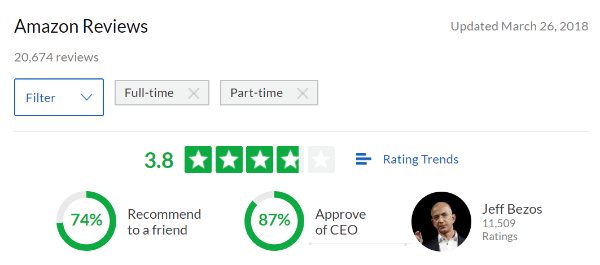
If we focus on Glassdoor’s three primary metrics – Overall rating, Recommend to a friend, and Approve of CEO, for brevity purposes, it’s apparent there is a significant difference between current and former employee reviews. For a summary of all the ratings, please see the table at the end of this post.
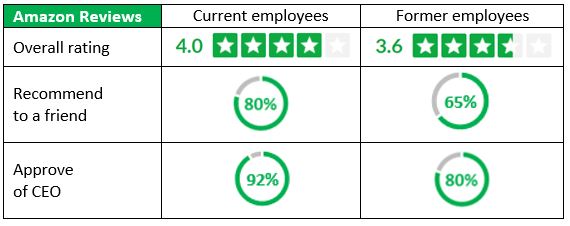
Threat or opportunity?
Are the results for Amazon typical? In short, yes.
We noticed after analyzing many companies’ rankings on Glassdoor that former employees’ ratings are always lower than current employees’. In many cases, like Amazon, meaningfully lower. Intuitively, this makes sense since they are no longer with the company. However, it also presents an opportunity. If you raise the reviews posted by former employees, it boosts the combined ratings posted on Glassdoor that are viewed by millions of interested job candidates.
Continuing this line of thinking, we wondered if formal alumni programs have a positive impact on companies’ Glassdoor reviews. We didn’t have to go too far to find an exemplar company since I started the Microsoft® Alumni Network in June 1995. It was also helpful for our analysis that both companies are headquartered in Seattle, are in the tech sector, and have the same relative number of total reviews, as well as the split between current and former employee reviews.
For Amazon, the split between current and former employee reviews was 66% and 34% respectively; while Microsoft had a 63% for current employees and 37% for former employees. It should be noted that Amazon does not have a formal alumni program and neither company is a PeoplePath client.
Here’s Microsoft’s Glassdoor dashboard before we started our analysis.
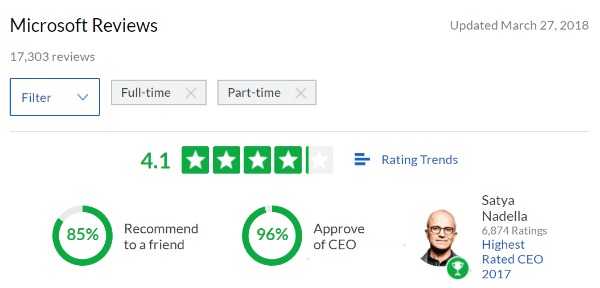
After applying Glassdoor filters and doing the math, we arrived at the breakdown between current and former Microsoft employees (see table). The Overall rating is the same for current and former employees, as is the Approve of CEO rating, and there is only a small difference between the willingness to Recommend to a friend. So, one could reason that, at least in Microsoft’s case, having a formal corporate alumni program has had positive impact on its Glassdoor reviews.
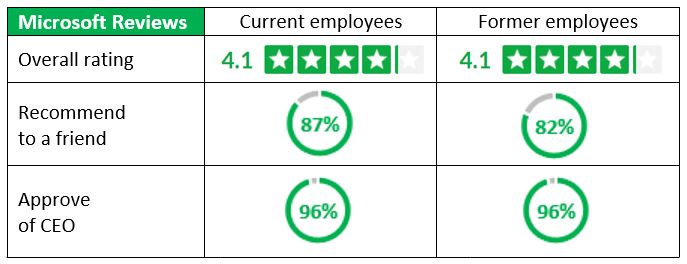
Anomaly or trend?
Does the difference between Amazon and Microsoft represent an anomaly or a trend?
An examination of the Fortune 1000 companies that have formal alumni programs reveals that all of them have higher Glassdoor reviews from their former employees, like Microsoft, than their peers without alumni programs, like Amazon.
The table below summarizes the averages for companies with alumni programs and without alumni programs. According to Glassdoor, the average company rating on Glassdoor is 3.5. Companies without an alumni program that we examined have slightly higher reviews than the average for the site. On the other hand, companies with an alumni program have a 17% higher rating than the overall average for Glassdoor.
How to take advantage of the findings
In today’s hypercompetitive world, companies need every advantage they can create to attract and retain the top talent. Having a thriving alumni program communicates to both your current and former employees that you care about them while they’re with you and after they leave. Apparently, that message is heard loud and clear. Are you listening?
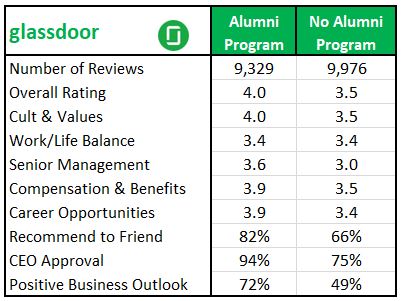
Complete Summary of Glassdoor Reviews for Amazon and Microsoft
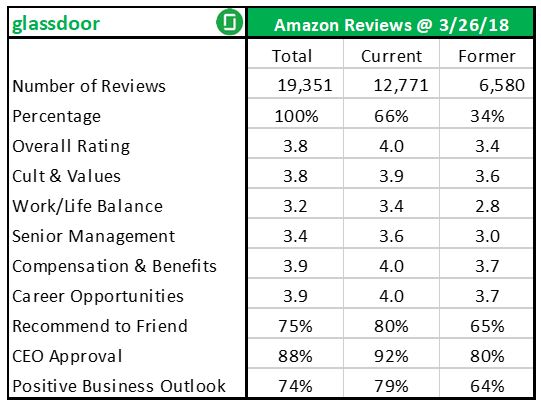
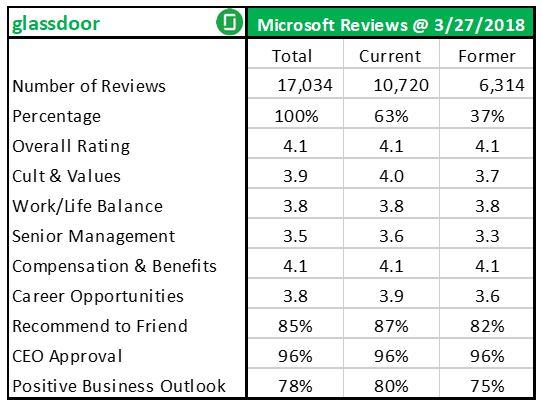
*Amazon and Microsoft are registered trademarks of the respective parties.


